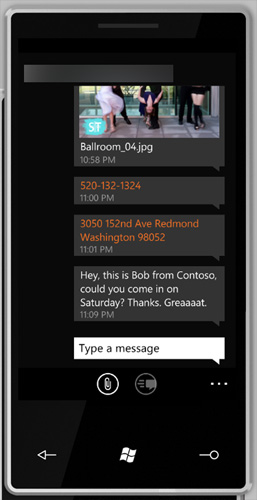Windows Phone 7: The AnandTech Guide
by Brian Klug on March 21, 2010 12:00 AM EST- Posted in
- Smartphones
- Windows Phone 7
- Mobile
The State of Cut and Paste
Microsoft stated explicitly and rather abruptly during a Q&A session during day two of MIX10 that there will be no copy and paste support in Windows Phone 7 Series. The annoucement was as simple and unambiguous as that; current plans are that Windows Phone 7 Series hardware shipping holiday 2010 will not have cut and paste support.
This is relatively ironic, considering Windows CE and Windows Mobile have had copy and paste support since day one. Furthermore, Windows Mobile users long cited lack of copy and paste support as a fundamental shortcoming present in other competing OSes. Obviously, having no support for clip-boarding or copy and paste is a step backwards. At this point it's a decision backed up by what Microsoft cites as a number of use studies which show people don't really use copy and paste. Microsoft left the door open slightly, noting that it "isn't sure when it will be added," but then later clarified and noted that it would likely not be included in the current release.
The reasons for this decision are ultimately puzzling. Microsoft cites a number of use studies mentioned earlier where users generally focus on a few predictable forms of information: addresses, phone numbers, or snippets from a web page. Instead of letting users copy and paste this information, it's hoping that users long-press on context-highlighted text and take action from there. "People often want to take an address and view it on a map, highlight a term in the browser, and do a search or copy a phone number to make a call. Instead of the user manually doing a copy and paste in these scenarios, we recognize those situations automatically and make them happen with just one touch," said Casey McGee, a senior marketing manager in Microsoft's Mobile Communications Business group.
The implementation is relatively similar to what we've seen already on iPhone OS. Text the OS recognizes as being a semantic match for either a phone number or address is highlighted. Tapping on those launches either the dialer, or Bing maps, as expected.

Note the orange text - these are clickable
Longer presses on almost anything result in another dialog appearing. From here, you can forward through SMS or email if the selection is text (or a URL), or save to the photo library or MMS if it is a picture.
Microsoft hopes this intelligent data-recognition process mitigates lack of copy and paste, but in practice there are many more use scenarios where true copy and paste support is advantageous.










55 Comments
View All Comments
pcfxer - Sunday, March 21, 2010 - link
Android is far easier to develop for than WM and iPhone. For my engineering project my team is developing a device for non-verbal users.pro5 - Monday, March 22, 2010 - link
Is android Java only? (I don't know) but if so that would reason enough for me not to develop for it. C# and objective C are 'bad enough' but java has always left me cold (I'm a C++ coder mainly).If it can use native C++ then great, still doesn't make up for it's other short comings. The only real advantage I see to Android is how 'open' it is, but really that's more of killer than a helper in the dev community (if money is your goal). How does the GPU compare to Winphone for example? Where is the 'standard' development target (screen size, hardware features). Stuff like iPhone and WP7 are 'easier' to develop for because you never need to 2nd guess the user's hardware config or screen size (ok 2 sizes in the case of WP7 in future)
Penti - Monday, March 22, 2010 - link
Android has the NDK so you can run native code, you don't need to run your code in dalvik. That means C and C++. Just as any other Linux based Phone OS. Such as WebOS. Of course Maemo too. Bada too of course, and of course none Linux based Symbian.The shit runs at the same hardware so what's your problem? Nobody is forcing you to develop for free. That you can release your apps without review is not a bad thing. Apps such as Firefox (Fennec) are ported to Maemo and being ported to Android. There's an Alpha for WinMo too. Something that can't be done on iPhone OS or Blackberry. Or WP7. If you only want to develop for a specific phone thats fine, but then you miss millions of other users. Even if you do android apps you don't need to support every single phone there is. Old phones won't be upgraded to newer versions of Android OS any way. And it's really the software platform that should have the focus any way.
jms102285 - Saturday, April 3, 2010 - link
Hey Anand, I sent you an E-mail regarding what the implications of Microsoft Communications Server just before the release of the WP7 is.... I haven't heard anything back yet in over a week from anyone I mailed about it.Are you guys tight-lipped about it because of NDAs or something???
CSMR - Sunday, March 21, 2010 - link
Not really (http://jkontherun.com/2009/11/23/windows-mobile-vs...">http://jkontherun.com/2009/11/23/window...droid-wi... but hopefully it will be within a year.I'm hoping that it will get full, reliable exchange support (e-mail+calendar+tasks+scheduling meetings+search server etc.).